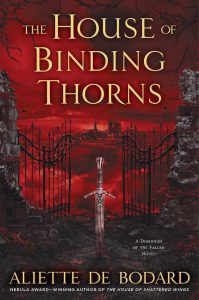
The House of Binding Thorns by Aliette de Bodard (Dominion of the Fallen #2)
Genre: Urban Fantasy
Publisher: Ace Books on April 4, 2017
Source: Publisher
![]()
![]()
![]()
![]()
My thanks to the publisher for providing me with a digital review copy. No compensation was provided for this review, and all opinions are my own.
The multi-award-winning author of The House of Shattered Wings continues her Dominion of the Fallen saga as Paris endures the aftermath of a devastating arcane war….View Spoiler »
![]()
![]()
![]()
Aliette de Bodard burst onto the SF/F scene with her novel THE HOUSE OF SHATTERED WINGS, an urban fantasy that introduced an alternate Paris ravaged by a war between Houses of Fallen angels. Now she returns to that world in THE HOUSE OF BINDING THORNS, delving more deeply into the political structure of the Houses and the personalities behind them…especially House Hawthorn and its mercurial leader Asmodeus.
While the first book was largely set in House Silverspires, THE HOUSE OF BINDING THORNS is set in House Hawthorn, the strongest and most feared of the Fallen Houses in Paris. I was particularly excited about this since Hawthorn – and Asmodeus – looms large in the mind of Madeleine in the first book, and I wanted to see if it lived up to her memory. Madeleine is a lot of things, but she’s not necessarily wrong about Hawthorn: it is just as terrible and dark as she remembers. But it is also more nuanced, and there’s more to Asmodeus than she would care to admit. Dragged back to Hawthorn against her will, Madeleine occupies a liminal space in the House: she is one of its dependents, but she’s also poised on the edge of knife as someone who opposed Asmodeus’ rise to power. The human alchemist who barely escaped Hawthorn with her life on the night Asmodeus took power is going to have to toughen up if she wants to survive…and she’ll need to kick her addiction to angel essence to do it.
The scheming and plotting of the Houses reveals the seedy underbelly of their political structure: while some House leaders may present themselves as more benevolent than others, all Houses are the same in the end. They will jockey for position, fighting tooth and claw for power that will ensure their dominance…but also ensure the safety and stability of their human dependents. In a city crumbling around them, humans have no safe place to turn lest they be plagued by gangs or used as pawns in Fallen skirmishes. Joining a House is the lesser of two evils, a moral concession that recurring character Philippe understands all too well.
An Annamite (or Vietnamese) man who’s less human than he appears, Philippe came to Paris decades ago as a result of Fallen conquest. His jaded, cynical perspective of the Houses illustrates how the Fallen dominate all those around them, choking out other forms of magic with angel essence in the same way an invasive weed takes over a garden. While this commentary is far from subtle, I appreciated the exploration of white cultural dominance and colonialism on Annamite culture. De Bodard is able to weave together a complex plot, several tangled mysteries, and deep philosophical questions with ease, and she’s earned herself at least one dedicated fan as a result.
As much as I enjoyed the Hawthorn scenes and the political commentary, the dragon kingdom definitely stole the show for me. Paris has been left crumbling after the war, with all manner of debris and fallout making their way into the waters of the Seine where the dragons make their home. Their kingdom is a study in opposites: ornate Vietnamese inspired architecture and art juxtaposed with the slow decay of the kingdom and its people. The dragons are under siege from the Fallen, both directly and as a result of the pollution from their pointless war. But young dragon Thuanh will do anything to save his people from extinction and bring stability to his fractured kingdom, even if it means allying himself with one of the Houses. Even if that House is Hawthorn. I adored Thuanh, with his self-assured yet shy way of dealing with politics and diplomacy. It’s also refreshing to see queer characters and relationships normalized amongst both the Fallen and the dragons.
Complex, creative, and diverse, THE HOUSE OF BINDING THORNS is an impressive sequel that tugged on my heartstrings and made me think deeply about racial and cultural politics. It’s that rare beast: a sequel that outshines an already impressive series debut. Highly recommended.